Dear friends,
Greetings from the desk of Tricontinental: Institute for Social Research.
Remarkably, during her visit to Ghana in late March 2023, U.S. Vice President Kamala Harris announced that the US Treasury Department’s Office of Technical Assistance will ‘deploy a full-time resident advisor in 2023 to Accra to assist the Ministry of Finance in developing and executing medium- to long-term reforms needed to improve debt sustainability and support a competitive, dynamic government debt market’. Ghana certainly faces significant challenges in this arena, with its external debt standing at $36 billion and its debt to Gross Domestic Product ratio hovering over 100 percent. As Harris left Accra, Reuters reported that Ghana had hired the Bermuda-based financial advisor Lazard to represent it in talks with the Paris-based Rothschild & Co., which will represent the international bondholders that are the largest creditors of this cash-strapped nation. Rather than pressure these wealthy bondholders to cancel some of the debt (what is known as a ‘haircut’) or to extend a moratorium on debt servicing payments, the US government merely provided Ghana with a ‘technical advisor’.
In December, Ghana signed an agreement with the International Monetary Fund (IMF) through its Extended Credit Facility to receive $3 billion over three years. In return, Ghana’s government agreed to ‘a wide-ranging economic reform programme’ that includes a commitment to ‘increase domestic resource mobilisation and streamline expenditure’. In other words, Ghana’s government will conduct an austerity regime against its own people. At the time of this agreement, consumer inflation in the country had risen to 54.1 percent. By January 2023, it was clear that electricity, water, gas, and home prices had risen by 82.3 percent over the course of a year. The World Bank estimates that Ghana’s poverty rate is already 23.4 percent, which it projects will ‘increase slightly, due to the cumulative effects of increases in electricity and water tariffs, rising food prices, and an increase in [consumption taxes]’. Further cuts to public spending alongside the restructuring of domestic debt will mean despair for almost all of Ghana’s roughly 33 million people.
 It is unlikely that the US government’s ‘full-time resident advisor’ on Ghana’s debt will offer either a factually based assessment of the escalating debt or proffer practical solutions to what has become a permanent debt crisis. It is already clear that there will be no focus on the wealthy Western bondholders such as the United Kingdom’s Abrdn and Amundi or the United States’ BlackRock, which hold a considerable portion of Ghana’s 13 billion dollars in Eurobond debt. It is far easier for the US to blame China, even though the country holds less than ten percent of Ghana’s external debt. That is perhaps the reason why Ghana’s President Nana Akufo-Addo told Harris, ‘There may be an obsession in America about Chinese activities on the [African] continent, but there’s no such obsession here’.
It is unlikely that the US government’s ‘full-time resident advisor’ on Ghana’s debt will offer either a factually based assessment of the escalating debt or proffer practical solutions to what has become a permanent debt crisis. It is already clear that there will be no focus on the wealthy Western bondholders such as the United Kingdom’s Abrdn and Amundi or the United States’ BlackRock, which hold a considerable portion of Ghana’s 13 billion dollars in Eurobond debt. It is far easier for the US to blame China, even though the country holds less than ten percent of Ghana’s external debt. That is perhaps the reason why Ghana’s President Nana Akufo-Addo told Harris, ‘There may be an obsession in America about Chinese activities on the [African] continent, but there’s no such obsession here’.
The final section of our latest dossier, Life or Debt: The Stranglehold of Neocolonialism and Africa’s Search for Alternatives, offers practical policy proposals for countries that are afflicted by permanent debt crises. Among them are suggestions to create progressive tax codes, reform domestic banking infrastructure, build alternative sources of funding to the IMF’s debt-austerity trap, and enhance regionalism. Given that the IMF and the World Bank punish any country that deviates from their orthodoxy, such policies would have been unthinkable even a decade ago. Now, with the arrival of alternative sources of financing for development (from China, certainly, but also from other locomotives of the Global South), space has been opened up for the poorer nations to build their own national and regional projects that are grounded in genuine, and sovereign, development theories. As we write in the dossier, ‘These projects must seize multiple opportunities to raise funds, and the fragility of IMF power must also be utilised to advance fiscal and monetary policies that are built on an agenda committed to solving the problems of the African people, not facilitating the demands of wealthy bondholders and the Western states that back them’.
 The principles that ground our dossier emerged out of a statement written by the Collective on African Political Economy (CAPE) entitled The IMF Is Never the Answer, which is published in the dossier. Among other key reflections, this statement points out that there is a need for a ‘new kind of institutional apparatus that fosters cooperation rather than competition’, which includes ‘establishing currency arrangements that bypass the US dollar’. Why is de-dollarisation such an important point? US Senator Marco Rubio provided clear insight to this question: ‘We won’t have to talk about sanctions in five years because there will be so many countries transacting in currencies other than the dollar that we won’t have the ability to sanction them’. Reliance upon the dollar not only allows the US to sanction countries; it is also ‘a strong lever of IMF conditionality’, as the CAPE statement notes. The statement also indicates the importance of the ‘urgent need to restore and reinvigorate the capacity and autonomy of the African state to deliver on its development agenda’. This includes increasing the ability of states to mobilise tax revenues and use these funds to build the dignity of their populations. Any approach to development in our times that respects nations’ sovereignty must be focused on creating a new form of financing for development apparatuses as well as a new role for state institutions in this process.
The principles that ground our dossier emerged out of a statement written by the Collective on African Political Economy (CAPE) entitled The IMF Is Never the Answer, which is published in the dossier. Among other key reflections, this statement points out that there is a need for a ‘new kind of institutional apparatus that fosters cooperation rather than competition’, which includes ‘establishing currency arrangements that bypass the US dollar’. Why is de-dollarisation such an important point? US Senator Marco Rubio provided clear insight to this question: ‘We won’t have to talk about sanctions in five years because there will be so many countries transacting in currencies other than the dollar that we won’t have the ability to sanction them’. Reliance upon the dollar not only allows the US to sanction countries; it is also ‘a strong lever of IMF conditionality’, as the CAPE statement notes. The statement also indicates the importance of the ‘urgent need to restore and reinvigorate the capacity and autonomy of the African state to deliver on its development agenda’. This includes increasing the ability of states to mobilise tax revenues and use these funds to build the dignity of their populations. Any approach to development in our times that respects nations’ sovereignty must be focused on creating a new form of financing for development apparatuses as well as a new role for state institutions in this process.
If you are interested in getting involved with CAPE, do write to the collective’s coordinator, Grieve Chelwa, at [email protected].
 At the mid-April World Bank meeting, Ajay Banga, a former executive from Citigroup and Mastercard, will be anointed as its president. He will be the fourteenth US citizen to hold this job and the fourteenth man since the bank’s first president was appointed in 1946. Banga has no experience in the world of development – prior to commercial banking, he was involved in launching the US fast-food franchises Pizza Hut and Kentucky Fried Chicken in India. Meanwhile, the New Development Bank, also referred to as the BRICS Bank, has just elected its new president, Dilma Rousseff, the former president of Brazil. Rousseff comes to the BRICS Bank with extensive experience in Brazil’s programme to eradicate absolute poverty. Unlike Banga, who will promote the religion of privatisation, Rousseff will bring her experience of working with robust state policies, such as the income transfer programme Bolsa Família (‘Family Grant’) and the social protections programme Brasil Sem Miséria (‘Brazil Without Extreme Poverty’). As we note in the dossier, the emergence of the BRICS Bank, alongside other institutions in the Global South, has already begun to put pressure on the IMF and World Bank on key issues such as the exhaustion of the neoliberal debt-austerity model and the need for new tools, including capital controls, for governments to increase the sovereignty of their states and the dignity of their populations.
At the mid-April World Bank meeting, Ajay Banga, a former executive from Citigroup and Mastercard, will be anointed as its president. He will be the fourteenth US citizen to hold this job and the fourteenth man since the bank’s first president was appointed in 1946. Banga has no experience in the world of development – prior to commercial banking, he was involved in launching the US fast-food franchises Pizza Hut and Kentucky Fried Chicken in India. Meanwhile, the New Development Bank, also referred to as the BRICS Bank, has just elected its new president, Dilma Rousseff, the former president of Brazil. Rousseff comes to the BRICS Bank with extensive experience in Brazil’s programme to eradicate absolute poverty. Unlike Banga, who will promote the religion of privatisation, Rousseff will bring her experience of working with robust state policies, such as the income transfer programme Bolsa Família (‘Family Grant’) and the social protections programme Brasil Sem Miséria (‘Brazil Without Extreme Poverty’). As we note in the dossier, the emergence of the BRICS Bank, alongside other institutions in the Global South, has already begun to put pressure on the IMF and World Bank on key issues such as the exhaustion of the neoliberal debt-austerity model and the need for new tools, including capital controls, for governments to increase the sovereignty of their states and the dignity of their populations.
 Ten years ago, the Nigerian musician Seun Kuti released a song called ‘IMF’ in his album A Long Way to the Beginning. The song is a damning critique of IMF policy, and the video, directed by Jerome Bernard, develops that critique through the personage of an African businessman being bribed and, ultimately, turned into a zombie. When King Midas touched objects, they turned into gold. When the IMF touches people, they turn into zombies. The art in our dossier is based on images from Seun’s music video, some of which are reproduced in this newsletter. The song is hypnotic:
Ten years ago, the Nigerian musician Seun Kuti released a song called ‘IMF’ in his album A Long Way to the Beginning. The song is a damning critique of IMF policy, and the video, directed by Jerome Bernard, develops that critique through the personage of an African businessman being bribed and, ultimately, turned into a zombie. When King Midas touched objects, they turned into gold. When the IMF touches people, they turn into zombies. The art in our dossier is based on images from Seun’s music video, some of which are reproduced in this newsletter. The song is hypnotic:
So much lying from the IMF
People powerSo much stealing from the IMF
People powerSo much killing from the IMF
People powerManipulation from the IMF
People powerIntimidation from the IMF
People powerSo much suffering from the IMF
People power
Warmly
Vijay

